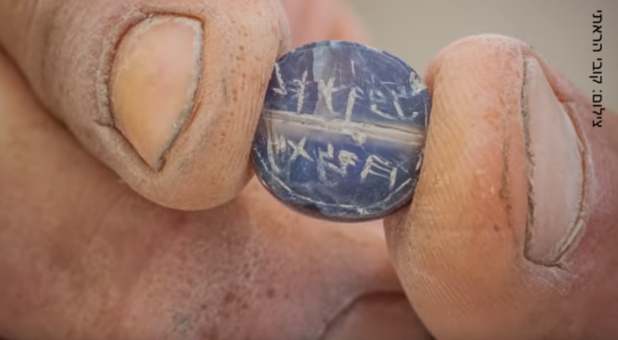Did Archaeologists Just Discover the Seal of King David’s Son?
A 2,600-year-old bulla, or seal, bearing the Hebrew words Adenyahu Asher Al Habayit, which translate to “Adenyahu by Appointment of the House” was uncovered three weeks ago. It was found by a volunteer sifting through dirt excavated from 2013 under Robinson’s Arch near the Western Wall.
Adenyahu was a son of King David. There are two other mentions of the name, one of a Levite in the times of King Jehoshaphat and another in the days of Nehemiah, a fifth-century figure who led the Jews back to Judea from Babylon.
“This is the first time this kind of archaeological discovery has been made in Jerusalem. The biblical title Asher Al Habayit was the highest ranking ministerial position beneath the king during reigns of the kings of Judea and Israel. It is undoubtedly of great significance,” Israeli archaeologist Eli Shukron of the Israel Antiquities Authority said.
Doron Spielman, vice president of the City of David Foundation, which operates the archaeological site, said “This tiny bulla has immense meaning to billions of people worldwide.”
“The personal signet of a senior official to a biblical king from the First Temple Period. This is another link in the long chain of Jewish history in Jerusalem that is being uncovered and preserved at the City of David on a daily basis.” he said.
The discovery follows another in March of a bulla and a 2,600-year-old stamp bearing Hebrew names uncovered in the City of David.
They were found in a large public building destroyed in the sixth century B.C., likely during the Babylonian destruction of Jerusalem in 586 B.C.
The seal impression, dated to the First Temple period, featured the words: “(belonging) to Nathan-Melech, Servant of the King” (LeNathan-Melech Eved HaMelech).
The name Nathan-Melech appears once in the Bible, in the second book of Kings 23:11, where he is described as an official in the court of King Josiah, who took part in the religious reform that the king was implementing.
The title “Servant of the King” (Eved HaMelech) appears often in the Bible to describe a high-ranking official close to the king. The seal impression was the first archaeological evidence of the Biblical name Nathan-Melech.
Bullae are small pieces of clay impressed by personal seals, used in ancient times to sign letters. Made of ceramic-like material, they survive the ages, unlike the parchment letters they embossed. {eoa}
This article originally appeared at World Israel News.






































